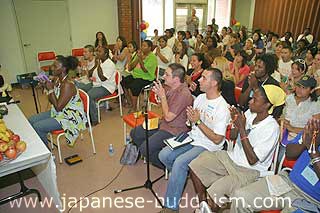Buddhist Chants and Mantras | The Science Behind the Power
(Anmol: Here is an insightful article by guest author Hugo Deslippe. Hugo is an avid spiritual aspirant and shares his discoveries about Zen and Buddhism on his great website and blog http://www.japanese-buddhism.com/. Do check it out…)
If you would like to be a guest author on Master of Meditation and Yoga, please email me at anmol@anmolmehta.com).

How Can Sounds Uplift Your Soul
Buddhist Chants and Mantras
By,
Hugo Deslippe
In many traditions, people use the power of speech to communicate with the divine. In the bible, it states that at the beginning was the word. In Japanese Shinto, the sound ‘su’ is the sound of the universe before the big bang and it is used when reciting kotodama. In Hinduism and Buddhism, people recite mantras to create a special state of mind, appropriate for communicating with the divine.
Sounds are waves when they travel in the air. Just like light is also waves. The main difference is the speed and undulation of the sound wave. If you have never see this great video of shapes made by different wave lengths, you need to watch it.
What does it mean for us in our spiritual practice? Simply put, sound is energy and it affects the material world. This is why mantras and sutras are so powerful.
Each sound has a different effect on the body and on the brain. In Chinese Taoist Qigong, for example, the sound Shhhhhhh, sub-vocally is associated with the liver and gall bladder. It will stimulate these organs when said properly.
Sounds also carry emotional energy and will affect each individual in a certain way. These are mostly related to past experience. For example, someone hearing the roaring of an airplane might remember a trip to Tahiti and it will be a pleasant experience but another might remember bombers dropping devastation on his village during the war.
This brings me to my last point: triggers.
Sound Triggers
Triggers are mechanism created to quickly reach a physiological or a psychological state. The most famous trigger experiment is Pavlov’s dogs. I’m sure you have heard of it but I will repeat it anyway. the story goes that Ivan Petrovich Pavlov, a Russian psychologist, physiologist and physician had dogs that he always fed after ringing a bell (the trigger). Soon enough, the dogs learned that the bell meant food so they had a very physical reaction when hearing the bell. They started to salivate in anticipation of the food.

A sound trigger would then be easy to create to enhance our spiritual practice. For example, the ring of a soft bell at the beginning of a meditation session will send a message to the body and the brain that it is time to get into meditation mode. This, in turn makes it easier to attain some good results quickly, compared to someone who hears that same bell for the first time.
We can create sound triggers or some have already been created through the ages by past masters. According to the collective unconsciousness theory of Carl Jung, we can tap in this knowledge and energy by reciting the same sounds, in the same pattern our predecessors have done for generation.
They built a vast reserve of ‘energy’ or consciousness in the universe that we tap into each time we say a mantra or a chant a sutra. The effect of each sounds or text is marked by the intention of the person chanting it. If a mantra has been chanted for thousands of years with the intention of creating peace in our soul or to be closer to god, the person who chants it today with that same intention will add part of that universal reservoir to his chant, thus making it more efficient. This makes it useful to recite things that have been recited for a long time by gurus and masters before us.
If you would like to learn more about Buddhist chanting, in the Japanese tradition, please consult this site on Japanese Buddhism. It is an increasing database of information on Japan and Japanese religion.




Leave a Reply
Want to join the discussion?Feel free to contribute!